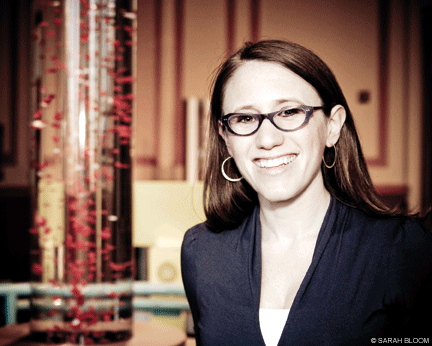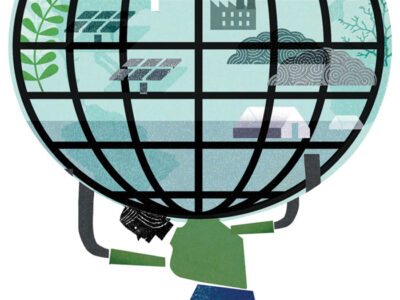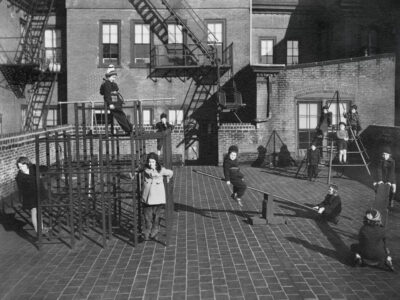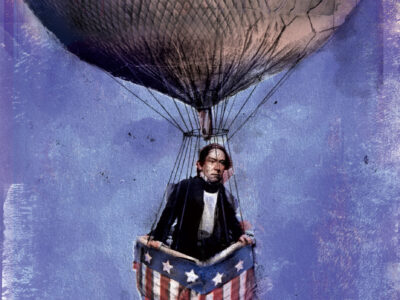
Class of ’02 | The challenge: Take a big, old, sprawling city that doesn’t really think of itself as a science town, even though on many levels it is—then put together a big, new, sprawling, citywide festival that is not only fun and engaging but will remind that city’s inhabitants of the importance and centrality of science in their lives, and maybe even steer some of them into a career in the sciences. The result is the Philadelphia Science Festival (philasciencefestival.org), which debuts this year from April 15-28 in venues around the city.
Organizing and staging something of that magnitude requires some special and seemingly incompatible skills. But then Gerri Trooskin EAS’02 SPP’06 is, by her own admission, a “very strange bird” with a singular set of skills.
For starters, those two Penn degrees are not a misprint. Most of Trooskin’s undergraduate work was in engineering and applied math (she majored in systems science and engineering), though she took her share of sociology courses on the side and put in many hours of volunteer work in West Philadelphia. After graduating, she realized that her heart wasn’t in the more traditional careers for systems engineers, whereupon she signed up with Americorps to run an afterschool program for the I Have a Dream Foundation of Boulder County, Colorado.
That experience reconfigured the arc of her career, leading her to earn a master’s degree at the School of Social Policy & Practice, with an emphasis on social welfare. But she never lost her engineer’s mindset, which would prove invaluable in detecting and solving inefficiencies in the organizational infrastructure of social-welfare programs.
Her first job after graduating was to run the One Book, One Philadelphia program at the Free Library, and she immediately put both of her degrees to work. In planning events all over town, “it was really important to make sure that we were meeting people where they were and making sure that everything was as accessible as it could be”—one of the foundations of social work. At the same time, “project management is all about engineering,” adds Trooskin, whose studies at SEAS included a project-management course. “I have my Microsoft Project books and everything. And it’s unbelievably useful. People would look at my spreadsheets at the library and say, ‘What is this? How did—I don’t understand.’ And that’s all from having an engineering background.”
So when she was tapped to be director of the science festival by the Franklin Institute (the city’s sponsoring institution), she was glad to learn that “the goal was for it to be a citywide event and for neighborhoods to be engaged, and for it to be as collaborative and community-driven as possible.”
Philadelphia is one of four US urban areas chosen by the Science Festival Alliance to receive a grant from the National Science Foundation. The others are San Diego (whose sponsoring institution is UC San Diego); Cambridge, Massachusetts (the MIT Museum); and the Bay Area of northern California (UC-San Francisco)—each of which is considerably more comfortable with its science identity than Philadelphia.
“This city was chosen to be part of this national movement of science festivals because it’s one of the premier science towns in the country,” Trooskin explains. “We have three major and many other research institutions within walking distance of one another. And Ben Franklin is our self-proclaimed founding father. We have a huge biotech and [pharmaceutical industry], and some of the best science museums and cultural centers in the country here. Yet when you ask your average Philadelphian what’s the major resource in this city, people don’t think, ‘Oh, it’s science.’”
Trooskin and her colleagues found that challenge exciting.
“We said, ‘Wow, we can have people engaged and be really creative in different ways,’” she says. “The first thing we realized was, OK, people are in their neighborhoods. It would be totally naive to plan events that all took place at universities and in Center City, because we would just be reaching an already science-literate community.”
One answer was to work with the Free Library system and recreation centers to put together what they call Neighborhood Science. Penn, Drexel, and the other city-based universities they’re working with, as well as cultural institutions like the Franklin Institute, the Philadelphia Zoo, and the Academy of Natural Sciences, will offer programs at the different library branches and recreation centers.
“We’re also hoping to engage student scientists and scientists who live in those neighborhoods to come out and say, ‘I’m a scientist,’ or ‘This is how I got to be a scientist,’” Trooskin says. “It’s not necessarily the same image that people have of what a scientist is—you know, an old white guy. We’re building a network of scientists who can go and speak to the general public about what it means to be a scientist and how they got to where they are.” That could range from Derrick Pitts, the Franklin Institute’s chief astronomer, to an engineer at SEPTA.
Thanks to some partnering with the Monell Center, a swarm of food scientists will descend on local restaurants and bars to talk about the science of taste—including the science of cheese and the science of spicy food.
On April 16 there will be a science carnival on the Benjamin Franklin Parkway, which Trooskin says will be an “opportunity for scientists to interact directly with the public through hands-on interactive activities.”
The following day the focus will shift to the Penn Museum, where Spencer Wells, the National Geographic Society’s explorer-in-residence and director of its Genographic Project, will discuss the use of genetics in identifying the Tarim Basin mummies [“When West Went East,” Jan|Feb].
Even bad science will make an appearance, as science historians and local actors converge on the Wagner Free Institute of Science in North Philadelphia “to look back at some science that we now consider to be bad or inaccurate.” Bleeding patients to balance their humors, for example, or the “science” of phrenology.
“We’ll have actors interpret some of those old texts,” says Trooskin, “and then have science historians there to put it into context.”
There will also be a Career Day, where open labs at the different universities and research centers will welcome school groups for tours and dispense information about admissions and special programs.
“This is an experiment in and of itself, right?” asks Trooskin rhetorically. “So I’m hoping that we’ll learn a lot this first year about how we’re serving our neighborhoods and what these neighborhood events are really doing. I’d like to start to activate some of the scientists who live and work in those neighborhoods, so that they can go out tell their neighbors that being a scientist is a much easier career path than being a player in the NBA.
“Our goals aren’t so grand that we think that we’re going to change the way that Philadelphia thinks about science in a two-week festival,” she adds. “But if we can attract a new audience and get people to think a little bit differently in these two weeks, then maybe they’ll seek out other events. Because science is fun. Science is engaging. And most of all, science is important.”—S.H.




